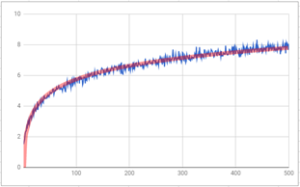 Although we are well on our way into 2018 (a semiprime year!), I wanted to take a moment to reflect on a busy 2017, one that included our last Pythagorean Triple day for a while.
Although we are well on our way into 2018 (a semiprime year!), I wanted to take a moment to reflect on a busy 2017, one that included our last Pythagorean Triple day for a while.
One of the biggest events for me this year was the launch of my column for Quanta Magazine. In Quantized Academy I write about the fundamental mathematical ideas that underlie Quanta’s stories on cutting edge science and research. This past year I’ve published columns on symmetry and group theory, gerrymandering, and pentagonal tilings, and some of my pieces have also appeared at Wired. It’s been a great experience (and challenge!) so far, and I’m looking forward to seeing where it goes in 2018.
I also continue to contribute to the NYT Learning Network (like this piece on gerrymandering) and have kept up the tradition of writing about the New York State Math Regents exams in 2017, which included one of the worst Geometry tests I’ve ever seen.
I also read a lot of books this past year, in an attempt to find healthier ways to spend my time, and I posted a list of some of the most interesting things I read in 2017. And thanks to a terrific mini-course on data representation with Mona Chalabi, I was inspired to create this Year in Math graphic.
I’ve continued to work to integrate mathematics and computer science in my classroom. This school year I’ve begun piloting a Mathematical Computing course, which is in part based on the work I’ve been doing in Scratch the past few years. I’ve presented about this work at Math for America, the NCTM Annual Meeting, and I’ve been featured by the Scratch Ed community. I plan on continuing to promote new work this year at similar venues.
I had another busy year speaking about mathematics, teaching, and technology. In addition to presenting at conferences like the NCTM Annual Meeting, I delivered the opening keynote at the inaugural MfA Summer Think conference, spoke at a STEM Grand Challenges event hosted by 100kin10, and participated in a panel discussion at the Global Math Week Symposium. I also designed and ran an interactive exhibit at the 2017 World Science Festival. Perhaps my biggest speaking honor this past year was keynoting Math for America’s annual Fall Function, where Giselle George-Gilkes and I spoke to 1,600 teachers and guests about the impact MfA has had on our careers. I already have a lot planned for 2018, but those with speaking inquiries can contact me here.
As always, I’m thankful to be able to reflect on a fulfilling professional year, and I look forward to another good one in 2018.
Related Posts
